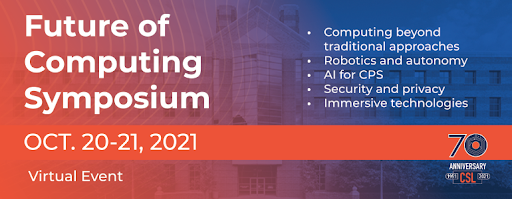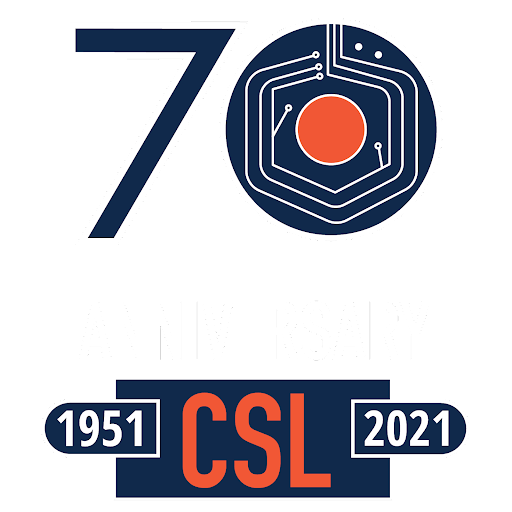 In 2021, the Coordinated Science Laboratory (CSL) celebrated their 70th anniversary with two big events: the Future of Computing Symposium (October 2021) and the AI and Social Responsibility Symposium (March 2022). The CSL is an Interdisciplinary Research Unit (IRU) in The Grainger College of Engineering at the University of Illinois Urbana-Champaign (UIUC) with a rich history of scientific and engineering advances. It brings together researchers from computing, communication, control, circuits, and beyond. CSL’s research covers the full computing stack, from circuits and high-performance applications to signal processing, machine learning, security and trust, and computing’s impact on society and the resulting need for social responsibility. The CSL recently released a white paper summarizing the major technological points, insights, and directions that speakers brought forward during the Future of Computing Symposium.
In 2021, the Coordinated Science Laboratory (CSL) celebrated their 70th anniversary with two big events: the Future of Computing Symposium (October 2021) and the AI and Social Responsibility Symposium (March 2022). The CSL is an Interdisciplinary Research Unit (IRU) in The Grainger College of Engineering at the University of Illinois Urbana-Champaign (UIUC) with a rich history of scientific and engineering advances. It brings together researchers from computing, communication, control, circuits, and beyond. CSL’s research covers the full computing stack, from circuits and high-performance applications to signal processing, machine learning, security and trust, and computing’s impact on society and the resulting need for social responsibility. The CSL recently released a white paper summarizing the major technological points, insights, and directions that speakers brought forward during the Future of Computing Symposium.

UIUC researchers and invited guests from other premier institutions discussed topics related to new computing paradigms, technologies, algorithms, behaviors, and research challenges to be expected in the future. The symposium opened with a discussion of new computing paradigms that are going beyond traditional computing, including neuromorphic computing, biological computing, and quantum computing. As part of the new computing paradigms, innovative security and privacy directions were stressed as integral parts of the future computing picture. The future computing paradigms cannot be considered without considering the end-to-end human-cyber-physical systems (HCPS) and with them the analysis of the end-to-end artificial intelligence (AI) needs. Furthermore, as future computing paradigms involve embedding of novel computer architecture, hardware, software, systems, and brain-interface advances to enable immersive environments for users, the boundaries between humans, machines, and cyber-physical environments will blur and become seamless. The challenges of achieving seamless integration of humans, machines, environments, and other HCPS applications were made clear in the final discussion on the integration of autonomous driving, robo-taxis, pedestrians, and future cities. Innovative approaches were outlined to motivate the next generation of researchers to work on these challenges.
After each session, speakers engaged in discussions on how research in computing, communication, control, and circuits is likely to evolve and advance digital transformation. The discussion brought out the importance of considering not just individual research areas, but innovations at the intersections between computing research efforts and relevant application domains, such as health care, transportation, energy systems, and manufacturing. You can learn more by reading the white paper here.
Be on the lookout for their next white paper summarizing key findings from their second event, the AI and Social Responsibility Symposium.









